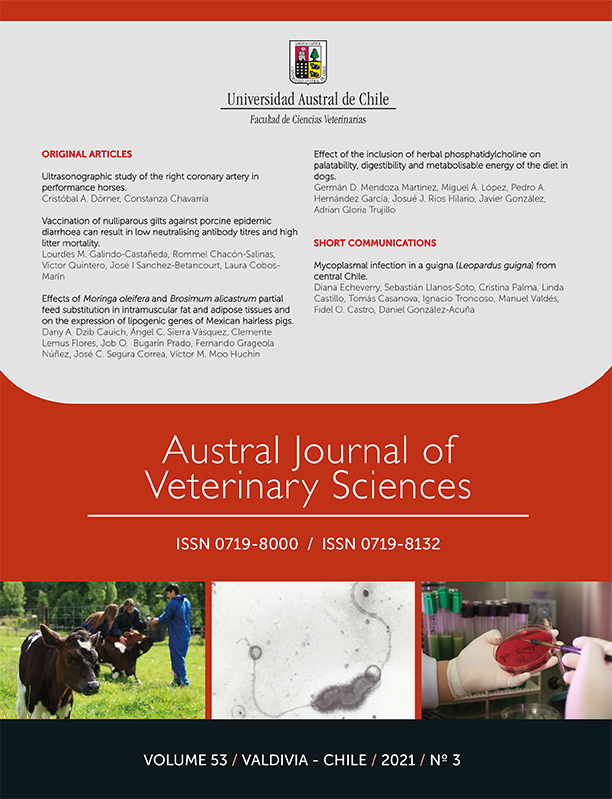Effects of Moringa oleifera and Brosimum alicastrum partial feed substitution in intramuscular fat and adipose tissues and on the expression of lipogenic genes of Mexican hairless pigs
Conteúdo do artigo principal
Resumo
The present study evaluated the effects of the inclusión of ground Moringa oleifera and Brosimum alicastrum leaf meal in the diet of Mexican hairless pigs (MHP) on the amount of intramuscular fat, subcutaneous fat, leg muscle (Biceps femoris) fat, loin muscle (Longissimus dorsi) fat, leg and back fat, and the expression of lipid metabolism genes. Hairless pigs are reared in the Mexican tropics and are characterised by their body and intramuscular fat accumulation. Eighteen male pigs fed for 82 d were randomly allotted to three experimental isoenergetic and isoproteic diets, where M. oleifera or B. alicastrum (six pigs per diet) replaced wheat bran. The diets used were a control diet, a diet with 10% M. oleifera leaf meal, and a diet with 10% ground B. alicastrum leaf meal. The M. oleifera diet decreased (P<0.05) the fat ratio in the Longissimus dorsi muscles, back fat, rib fat, total carcass fat, and the carcass fat: meat ratio. The B. alicastrum diet only decreased fat in the Biceps femoris muscle, back fat, and rib fat. Moringa oleifera and B. alicastrum diets also promoted the overexpression of mRNA from the stearoyl-CoA desaturase (SCD), fatty acid synthase (FASN), acetyl-CoA carboxylase alpha (ACACA), sterol regulatory element-binding protein 1 (SREBP1) and acyl carrier protein (ACP) lipogenic genes in the Biceps femoris muscle and leg fat (P<0.001). In addition, lower ACACA and SREBP1 mRNA expression in the Longissimus dorsi muscle and back fat (P<0.001) were related to the lower amount of fat in pigs fed M. oleifera and B. alicastrum. The inclusion of Moringa oleifera and Brosimum alicastrum meals 10% in the diet of the pig MHP reduces fat, this is an important finding because fat is abundant in this type of pig.

